情态动词can,may,must,need课件
情态动词(20张PPT)初中英语专项复习课件

(1)只作情态动词:must;can/could;may/might;ought to
(2)既可作情态动词又可作实义动词:need,dare
((34))既 具可 有作 情情 态态 动动词词某又些可特作征稿稿定助:定hPa动PPvTP,e词T/海h:量asd素ha材tlo持l;/s续hha更odublde;twteirll/would
【知识拓展】
1. must的一般疑问句,肯定回答为Yes, ...must.;否定回答为No, ...needn’t./No, ...don’t have
to.—Must I clean the classroom now? 我必须现在打扫教室吗?
—Yes, you must. 是的,你必须。/No, you don’t have to. /No, you needn’t. 不,你不必。
He promised he would never smoke again. 他承诺他再也不吸烟了。
Their English teacher would tell them stories in
表示过去反复发生的动 English after class.
作或某种倾向
他们的英语老师总是在课后用英语给他们讲故事
新,上千款模板选择总有一
款适合你
知识点二:情态动词的特点
情态动词的特点: (1)情态动词无人称和数的变化(have to除外); (2)情态动词后接动词原形; (3)情态动词的否定式是在其后加not; have to除外 (4)具有助动词的作用,可用来构成否定句、疑问句及用于简明答语; (5)个别情态动词有现在式和稿过定去PP式T两种形式,过去式用来表达更加客气、委 婉的语气,时态性不强,可稿用定于PPT过,海去量、素材现持在续更或将来。
情态动词全部ppt课件

Some festivals are held to satisfy the ancestors, who might return either to help or to do harm.
推测
17
--- Excuse me. Is this the right way to the Summer Palace?
3. will/would
1. 表示意愿,will表示现在的意愿, would表示过去的意愿。
I will stick to my plan though all of you are against it.
I told him to give up smoking, but he wouldn’t
3. During the vacation, he would visit me
every four days.
过去的习惯
4. Will / Would you pass me the ball,
please?
请求
习惯,倾向 5. Birds will fly to the south in the winter. 24
You can go with them if you like.
--- Could/Can I have a look at your new design? --- Yes, of course you can.
(注意此处答语不能用could)
8
3)用在肯定句中,表示_客__观__上__有__可_ 能 Anybody can make mistakes. Driving on the snowy roads can be very dangerous.
《情态动词表推测》课件

根据所给语境,选择合适的情态动词表达对过去事实的 推测。
通过实际语境中的情态动词使用,培养语言逻辑思维能 力。
练习题三:对将来事实的推测
掌握对将来事实的推测 理解情态动词在时间表达中的运用
提高语言表达能力
练习题三:对将来事实的推测
01
练习内容:
02
根据所给语境,选择合适的情态动词表达 对将来事实的推测。
《情态动词表推测》ppt课件
目录
• 情态动词表推测的定义 • 情态动词表推测的用法 • 情态动词表推测的注意事项 • 情态动词表推测的练习与解析 • 总结与回顾
01
情态动词表推测的定义
什么是情态动词
01
情态动词是表示说话人的语气和 态度的动词,它们通常与助动词 结合使用,表达可能性、必要性 、意愿等意义。
02
情态动词表推测的用法
对现在事实的推测
总结词
表示对目前情况的推测
详细描述
情态动词如“may”,“might”,“could”等可以用来表示对目前情况的推 测,通常基于某些证据或迹象,但不确定。例如:“It may be raining today ,based on the dark clouds in the sky.”
以上内容仅供参考,具体内容可以根据实际需求进行修改和 调整。
04
情态动词表推测的练习与解析
练习题一:对现在事实的推测
掌握对现在事实的推 测
提高语言实际运用能 力
理解不同情态动词的 细微差别
练习题一:对现在事实的推测
01
练习内容:
02
03
04
根据所给语境,选择合适的情 态动词表达对现在事实的推测
02
常见的情态动词有can、may、 must、should等。
《情态动词》PPT课件
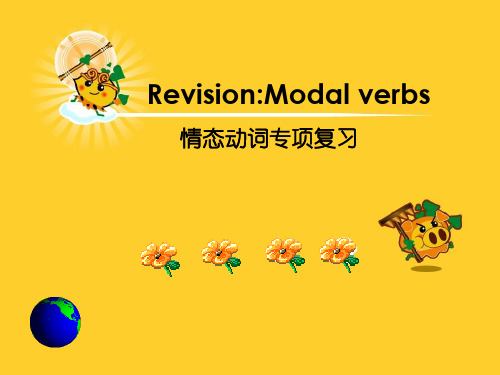
was/ were able to表示过去有能力并且成功地做了某事, 相当于managed to do something/ succeeded in doing something;
• Mr. Bush is on time for everything. How can it be that he was late for the opening ceremony? (表疑惑、惊讶)
表示请求、允许、允诺
1. 当对方是决策者时,你代表你(们)自己(I, We),或代表第三者(he,she,they)向对方 (you)请示或提出建议时用:
Revision:Modal verbs
情态动词专项复习
How many modal verbs
do you remember?
(情态动词)
一,常见的情态动词有:can, could, may, might ,must, shall, should, will, would, need, have to等
4、具有情态动词的某些特征的有:have(had) to, used to.
情态动词的特征
1、有一定的词义,但不能单独作谓语,它们要和行 为动词或连系动词连用,构成谓语。
2、适用于主语的各种人称和数 have to例外,主语 是第三人称单数时,要用has to)。如:
We/ He must work hard. 我们/他一定要努力工作。 I have to walk home. 我得步行回家。 He has to walk home. 他得步行回家。
情态动词(17张PPT)初中英语专项复习课件

表示需要、必须,主 要用于否定句和疑问 句中。needn’t常用 于回答must表请求的 否定回答
—Must I finish my homework now?我必 须现在完成我的家庭作 业吗? —No, you needn’t. 不, 你不需要。
注意 (1) must和have/has to均意为“必须”,常可互 换使用。但have/has to是用于强调客观需要,意为 “必须, 不得不”;must用于表示主观看法, 意为“ 必须, 应该”。如:We’ll have to ask Zhang Hong. 我们必须去问张红了。 We must work hard at school. 在学校我们必须 努力学习。
情态动词本身有一定的意义,但不能独立作谓语, 没有人称和数的变化,后面必须接动词原形。常见的情 态动词有:may, must, need, have to 等,具体用法见下表 :
情态动词
用法
例句
表示能力,意为 Sam can speak English well.
can “能,会”
山姆英语讲得很好。
He could have gone home. 他可能已回家了。
情态动词(may can must need)课件
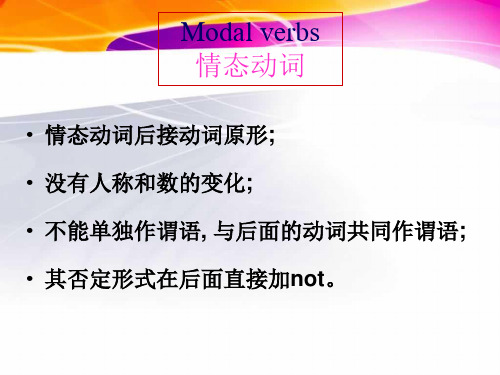
may / may not
may的用法:
1. 表示允许(可以) May I come in? 2. 表示推测 (可能) ----通常用于肯定形式 She may be still waiting for us. 3. 表示祝愿 May you have a happy weekend.
may not的用法:
• 2.情态动词(没有人称和数的变化) • need 用于句首构成一般疑问句或needn’t 才为情态动词。 注意:need作为情态动词 时,后面必须接动词原形。 • 常用句式: • Need sb. do sth? • sb. needn’t do sth. • eg. Need I go? • He needn’t go home by bus.
must not的用法:
1. mustn’t表示禁止(不准;不允许) You mustn’t smoke here. 2. 以must开头的疑问句,其否定回答要用 needn’t. -- Must I clean the classroom now? -- Yes, you must. No, you needn’t.
Modal verbs 情态动词
• 情态动词后接动词原形; • 没有人称和数的变化; • 不能单独作谓语, 与后面的动词共同作谓语;
• 其否定形式在后面直接加not。
Modal verbs 情态动词
• can / can not
• may / may not • must / must notLeabharlann can / can not
• • • • • • • • • • • • •
Exercises: (C) 1. He needs ___ time with his child. A. spends B. spending C. to spend D. spend ( B) 2. Tom___ some money to buy books. A. need to borrow B. needs to borrow C. needs borrow D. needs borrowing (C) 3. You___ there today. A. needn’t going B. needn’t to go C don’t need to go D. don’t need going (C) 4. The flowers needs___. A. waters B. to water C. watering D. watered
情态动词语法讲解PPT课件
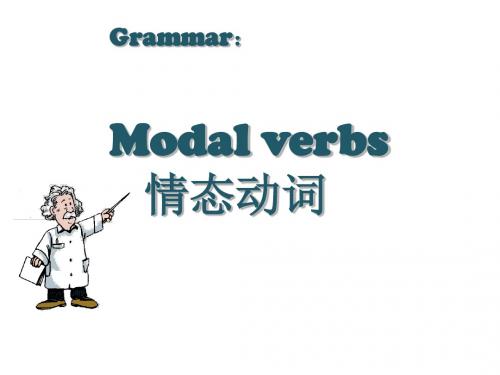
2表示“许可”和“不许”
a)请求对方“许可”可用can, could, may, might.
may/might较正式,could/might较委婉
表示给予“许可”通常用can/may,而不用 could/might
Could I use your phone? Yes, of course you can. Might I trouble you for a light? You may indeed.
表示将来的“必须”,常用have to的一定 形式(will/shall have to) 比较:
•We must do it again.(表示现在)
•We’ll have to do it again.(表示将来)
•表示过去的“必须”,常用had to
•I had to leave at six yesterday.
•They must be home by now.(他们现在一定到家了)
will/would表示“推测”可有三种情况
1)对特定事态的推测
A: Who’s that man over there? B: That will be George, no doubt. C: That would be George, I except.
• Can they have missed the bus?
• Yes, they may have.
may not重音落在助动词上,表示 “不可能”,重音落在否定词上,表 示“不许可” , 比较:
•He may not go tomorrow.
•He may not go tomorrow.
•所以在书面语中,表示“不可能” 常用can’t
高中英语《情态动词》ppt课件
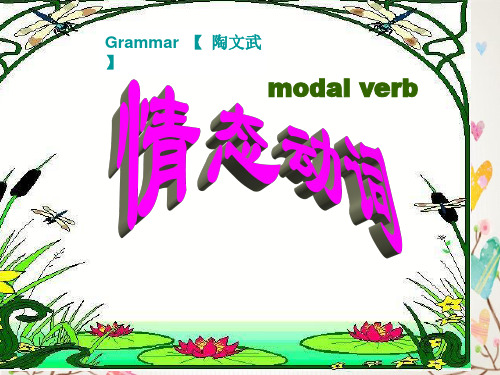
表示推测——情态动词的重要用法.
情态动词
对将来
肯定的推测
+ V.
must 常见must be
对现在
对过去
+ V.
+ have done
+ be doing
可能的推测
may!! might
否定的推测
can’t!! couldn’t
疑问的推测
can!! could
+ V.
+ V.
+ have done
三.Must +have done 表示对过去发生的事情作出的肯 定判断
它们在玩篮球!! 它们一定完成了作业??
They are playing basketball!! they must have finished their homework. 路是湿的??昨天晚上一定下雨了??
The road is wet. It must have rained last night.
She couldn’t have been at home.
三. can/could have done “本可以!!本来可能已经”用 于肯定句中!!表示对过去发生的事情做出的判断!!
您本来可以考的更好?? You could have had a better mark.
may/might
一.May/might表示推测时!!只能用于陈述句!!表示对现 在或将来要发生的动作把握不大?? 它们明天可能会到这里来??
It can’t be true! I don’t believe it.
When you are quite sure about something!! you
U6 初中 can may must 情态动词 PPT
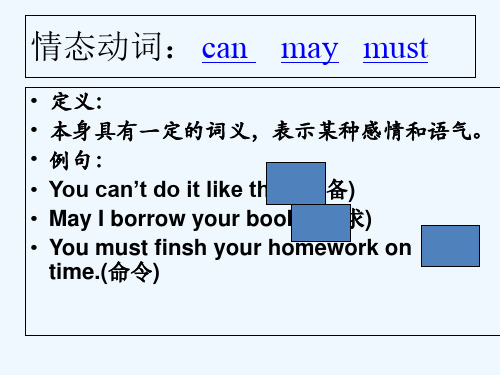
can • 观察:
• I can swim. Can you swim?
• I can't /cannot swim, but I can ski.
• •
总 1.c结an: 表示有__能__力__做原__某形_事_.
• 2.can 后面动词用____c_a_n_'_t . cannot
• 3. can的否定形式是:_提__前____或
You _m__u_s_t_n_’t_ __p_la_y_ _b_a_s_k_e_tb_a_l_l here. 5. -Must I stay here now?
-_N__o_, you _n_e_ed__n_'t_. You _m__a_y_/c_a_nleave now.
can may must
情态动词: can may must
• 定义: • 本身具有一定的词义,表示某种感情和语气。 • 例句: • You can’t do it like that.(责备) • May I borrow your book?(请求) • You must finsh your homework on
time.(命令)
1. 我会游泳但玛丽不会。 I _c_a_n__ _sw__im__ but Mary _c_a_n_'t___.
2. 我八点之前必须完成作业。 I _m__u_st_ _fi_n_i_sh_ my homework before eight o’clock. 3. 我可以借用你的自行车吗?
_M__a_y_ __I_ borrow ? 4. 你不可以在这里打篮球。
at school.
on the wall at night
outside the school on the paper in the KTV
高考英语情态动词课件(共21张PPT)
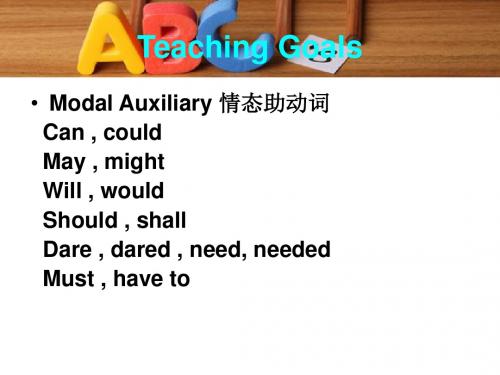
5)Should 表示说话人的惊奇、愤怒、失望等特殊情感 It’s surprising that Mary should love such a person as Jack. It’s strange that … It’s unthinkable that … I’m sorry that…
肯定疑问 Dare we run? 句
Do we dare (to) run?
否定疑问 Dare he not run? Doesn’t he dare to run ? 句
Need, needed
Need /needed
1、情态动词用于否定句,疑问句 He needn’t worry about it.
This will be the house you're looking for .
Will , would
5)would常用于虚拟条件句,表示与事实相反或不太可能实现的情况 But for your help we would have been late .
6) Would 表示过去的习惯性动作或某人的一典型动作,又使人厌烦的感 觉。 He would go swimming in summer when he was in the countryside.
3.表示请求和允许,与may同义,相当于be allowed to.常用语口语中。 You can smoke in this room. Could I borrow you dictionary?
Can , could
4.用于一些固定句型 a. Cannot ( can never) …too…怎么也不过分
如询问某种可能时,应用can。 He must know my address. (一定) He can’t know my address. (一定不) Can he know my address? (询问可能性)
情态动词can, may, must与need的用法区别.doc
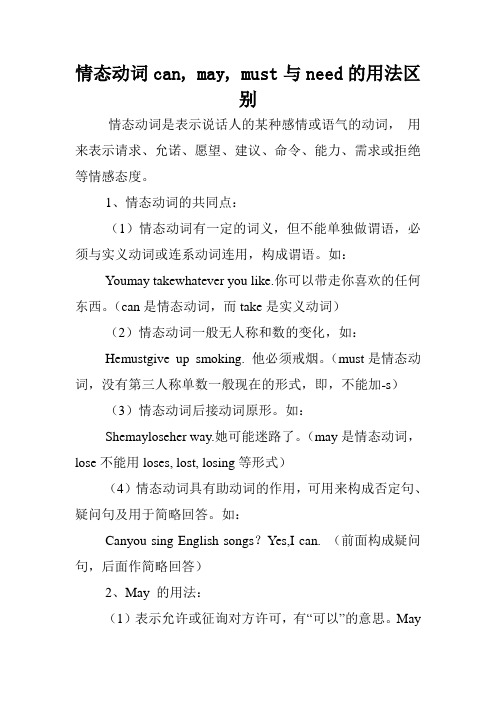
情态动词can, may, must与need的用法区别情态动词是表示说话人的某种感情或语气的动词,用来表示请求、允诺、愿望、建议、命令、能力、需求或拒绝等情感态度。
1、情态动词的共同点:(1)情态动词有一定的词义,但不能单独做谓语,必须与实义动词或连系动词连用,构成谓语。
如:Youmay takewhatever you like.你可以带走你喜欢的任何东西。
(can是情态动词,而take是实义动词)(2)情态动词一般无人称和数的变化,如:Hemustgive up smoking. 他必须戒烟。
(must是情态动词,没有第三人称单数一般现在的形式,即,不能加-s)(3)情态动词后接动词原形。
如:Shemayloseher way.她可能迷路了。
(may是情态动词,lose 不能用loses, lost, losing等形式)(4)情态动词具有助动词的作用,可用来构成否定句、疑问句及用于简略回答。
如:Canyou sing English songs?Yes,I can. (前面构成疑问句,后面作简略回答)2、May 的用法:(1)表示允许或征询对方许可,有“可以”的意思。
May not表示说话人“不许可”。
如:May I use your computer? 我可以用你的电脑吗?You may not go.你不可以去(2)在回答may 引导的疑问句时,肯定回答用may,否定回答用can’t或mustn’t,can’t表示“不可以,不能”,mustn’t表示“不准”。
如:-May I smoke here?我可以在这儿抽烟吗?-Yes,you may. /No,you mustnt. 是的,你可以(不,你不准)。
(3)may表示推测,意思是“可能”,否定形式may not 表示“可能不”。
You may be right. 你可能是对的。
(4)might是may的过去式,但表推测时,它并不表过去时态,它所表示的可能性比may小。
高中英语情态动词各种用法课件(共47张PPT)

一 、表能力 :表现在的或一般的能力:表示 现在的或一般的能力用can 或 be able to. 一 般的能力是指你无论什么时候做什么事情就 能做到的能力。表示现在的能力或一般的能 力时,can比be able to 更普遍。
A computer can’t think for itself; it must be told what to do. (表示一般的能力)
This can’t / couldn’t be done by him. (表示不 相信)
He could be on his way home now. (could 不 如 may / might常用)
Can this be done by him? (表示一种疑惑、 惊讶)
(3)would, could, should, might 并不一定 与过去的时间有关,而是表示可能性弱于他 们相应的现在形式。如:
do something / succeeded in doing sth.
The fire spread through the hotel very
quickly but everyone was able to get out. (过去有能力并成功地做了某事)
(3) could have + 过去分词,表示过去有 能力做但未做。
表示对过去已经发生的行为进行推测,意为 “想必 / 准是/ 一定做了某事
It must have rained last night, for the road was quite muddy.
The lights were out. They must have been asleep.
2. can have done
情态动词的用法PPT课件
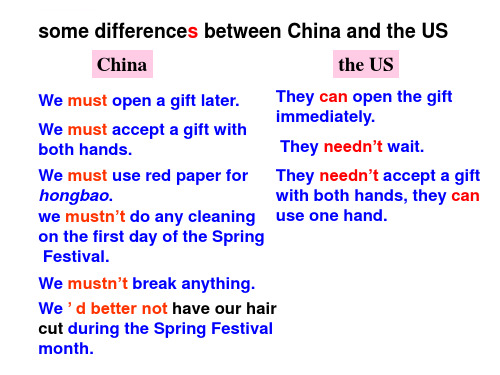
“雪亮工程"是以区(县)、乡(镇) 、村( 社区) 三级综 治中心 为指挥 平台、 以综治 信息化 为支撑 、以网 格化管 理为基 础、以 公共安 全视频 监控联 网应用 为重点 的“群 众性治 安防控 工程” 。
Exercises:
My brother was very ill, so I ( had to) call the doctor in the middle of the night.
“雪亮工程"是以区(县)、乡(镇) 、村( 社区) 三级综 治中心 为指挥 平台、 以综治 信息化 为支撑 、以网 格化管 理为基 础、以 公共安 全视频 监控联 网应用 为重点 的“群 众性治 安防控 工程” 。
some differences between China and the US
China
3 Underline the correct words.
注意: might为may的过去式,但也可以代替may, 语气较为婉转客气或更加不肯定。
“雪亮工程"是以区(县)、乡(镇) 、村( 社区) 三级综 治中心 为指挥 平台、 以综治 信息化 为支撑 、以网 格化管 理为基 础、以 公共安 全视频 监控联 网应用 为重点 的“群 众性治 安防控 工程” 。
— For your health, I’m afraid you ______. (2011贵州安顺)
A. may B. can C. have to D. need
“雪亮工程"是以区(县)、乡(镇) 、村( 社区) 三级综 治中心 为指挥 平台、 以综治 信息化 为支撑 、以网 格化管 理为基 础、以 公共安 全视频 监控联 网应用 为重点 的“群 众性治 安防控 工程” 。
情态动词can的用法课件

特点
情态动词没有人称和数的变化, 其后必须接动词原形。
情态动词分类
可能性情态动词
can, could, may, might
必要性情态动词
must, should, ought to
意愿性情态动词
will, would, shall, should
混淆can与may的用法
03
can表示能力和可能性,而may表示推测或允许,两者在语境中
应区分使用。
情态动词can拓展知识点
情态动词can的过去式
could,用法与can相似,但语气更委婉。
情态动词can与其他情态动词连用
如“You should can do it.”(你应该能做到。)表示强调。
用could表示推测与猜测
要点一
could用于推测过去或现在
could是can的过去式,但也可以用于表示对现在或过去的 推测,例如,“He could be busy.”(他可能很忙。)
要点二
could表示猜测的语气
与can相比,could表示的猜测语气更为委婉或不确定,通 常用于表示基于不完全信息或主观判断的推测,例如, “It could be a good idea.”(这可能是个好主意。)
情态动词can的用法课件
目录
CONTENTS
• 情态动词can基本概念 • 情态动词can表示能力 • 情态动词can表示可能性与推测 • 情态动词can与其他情态动词比较 • 情态动词can在特殊句型中的运用 • 情态动词can总结与拓展
01
CHAPTER
情态动词can基本概念
《情态动词课件》ppt课件

(00 上海)
My sister met him at the Grand A Theatre yesterday, so he ______ your lecture. A. couldn’t have attended
B. needn’t have attended C. mustn’t have attended D. shouldn’t have attended
24
Could 表可能性,语气较弱; 表请求,较委婉。 —Could you lend me some money? —Yes , I can. (98 上海) “ Could I call you by your first name?” C “ Yes, you _____. A. will B. could C. may D. might
3
情态动词可用来表示推测,语气从强到弱的顺序是: must,should,can,could, may ,might。
一.情态动词表示推测的用法
1.must所表示的可能性最大,最有把握,意为“一
定”。
2.can和could主要用于否定句和疑问句中 ,can’t
或couldn’t 表示“不可能”
3.may 和 might表示现在或将来可能发生的动作
13
(NMET 05)
B He ______ have completed his work; otherwise, he wouldn’t be enjoying himself by the seaside. B. must A. should C. wouldn’t D. can’t
14
6
3. ● He may not have finished the exercises, I’m afraid. may/might have done(过去) 或许/可能做 …(用于肯定或否定句中) 4. You could have done better, but you didn’t try your best. could have done (过去) 本能够做 (用于肯定或否定句中,带有责备、劝告之意)
- 1、下载文档前请自行甄别文档内容的完整性,平台不提供额外的编辑、内容补充、找答案等附加服务。
- 2、"仅部分预览"的文档,不可在线预览部分如存在完整性等问题,可反馈申请退款(可完整预览的文档不适用该条件!)。
- 3、如文档侵犯您的权益,请联系客服反馈,我们会尽快为您处理(人工客服工作时间:9:00-18:30)。
Yes, you can. (否定答语可用No, I'm afraid not.)
用法: ①表示请求或允许 : May I go home,please? (可以)
Yes, you may. No, you _m_u_s_t_n_’_t_/_you can’t.
must开头的疑问句,其否定回答通常用 don‘t have to 或needn’t 。而不用mustn't
---Must I finish my homework first? --- Yes, you must. --- No, you don't have to/ needn't.
(需要) 既可以做情态动词, 也可以做实意动词 用法: ① 情态动词 (need do sth) I need buy a big house.
9. You ___A_____do it if you really don't
want to.
A. needn’t B. mustn’t
C. can’t
D. couldn’t
10. — Could I borrow your dictionary?
— Of course you _A_____.
5. — Fifty dollars for such a T-shirt!
You __A__ be joking!
— I’m serious. It’s made of silk.
A. must
B. need
C. may
D. can
6. — Have you decided where to go for
情态动词—无人称变换,后接动词原形。
can的用法 may的用法 must的用法
need 的用法
用法:
He can speak a little English.
① 表示能力 : Can you fly a kite? Yes, I can. No, I can’t. Tom can’t / can not skate.
② 表示猜测: That can not be our English teacher. (用于疑问句、否定句)Can she be our head teacher? ③ 表示请求或允许 : Can / May I help you?
could也可表示请求,语气委婉,主要用于疑问句, 不可用于肯定句,答语应用can
— No, it __C__ be him. Mr Li is much
taller.
A. mustn’t B. may not
C. can’t
D. needn’t
2. — Could I look at your pictures? — Yes, of course you ___B___.
A. could B. can C. will D. might
3.__B___you pass me a pen? I’d like to
write down the telephone number.
A. Need
B. Could
C. Must
D. Should
4. — May I go to the cinema, Mum? — Certainly. But you __C__ be back by 11 o’clock. A. can B. may C. must D. need
book?
— Sure. Here you are.
A. Must
B. May
C.ቤተ መጻሕፍቲ ባይዱNeed
D. Will
8. You ___C____be tired after working for
eight hours without a rest.
A. can B. may C. must D. need
-- Yes, you do. /-- No, you don’t.
试比较 :
● You may not smoke here. 不可以
● You needn’t get to school so early. 不必
● You can’t smoke here. 不能 ● You mustn’t smoke here.千万不可;禁止
You might be right. We might not go to Australia.
用法:
① 表示义务、必要或命令 :
You must come early tomorrow.
② 表示推测“肯定,一定” :They must be at home. The light is on. ③ 否定时表示 “禁止” :You mustn’t smoke here.
A. can
B. must
C. should
D. will
He need drive me home. Need I buy a big house ? -- Yes, you must. -- No, you needn’t / don’t have to. (不必要)
② 实意动词 (need to do sth) :
He needs to buy a big house. Do I need to buy a big house ?
A. must B. can
C. mustn't D. needn't
3. You __D_ be quiet when you are in a
library.
A. may
B. can
C. will
D. must
1. — Who is the man over there? Is it Mr
Li?
1.--Must I come before eight o'clock?
--No, you ___D____.”
A. can't
B. don't
C. mustn't D. needn't
2.--Must I finish all the work before I leave? --Yes, you ___A____ .”
@ You may go home now, Susan. @ You may not smoke in the classroom.
② 表示可能性: You may be right. 也许,可能
We may go to Australia. might可以代替may,语气较为婉转客气或 更加不肯定。
can, may, must 的一般疑问句及肯、否回答: Can I…….?
Yes , you can. No, you can't. May I…..? Yes , you may(can). No, you can’t / No, you mustn’t. Must I….? Yes , you must. No, you needn't / don't have to Need I…..? need的一般疑问句及肯、否回答: Yes, you must. No, you needn't/don't have to
your summer vacation?
— Not yet. We __A__ go to Qingdao. It
is a good place for vacation.
A. may
B. should
C. need
D. must
7. — ____B_____ I borrow your history
